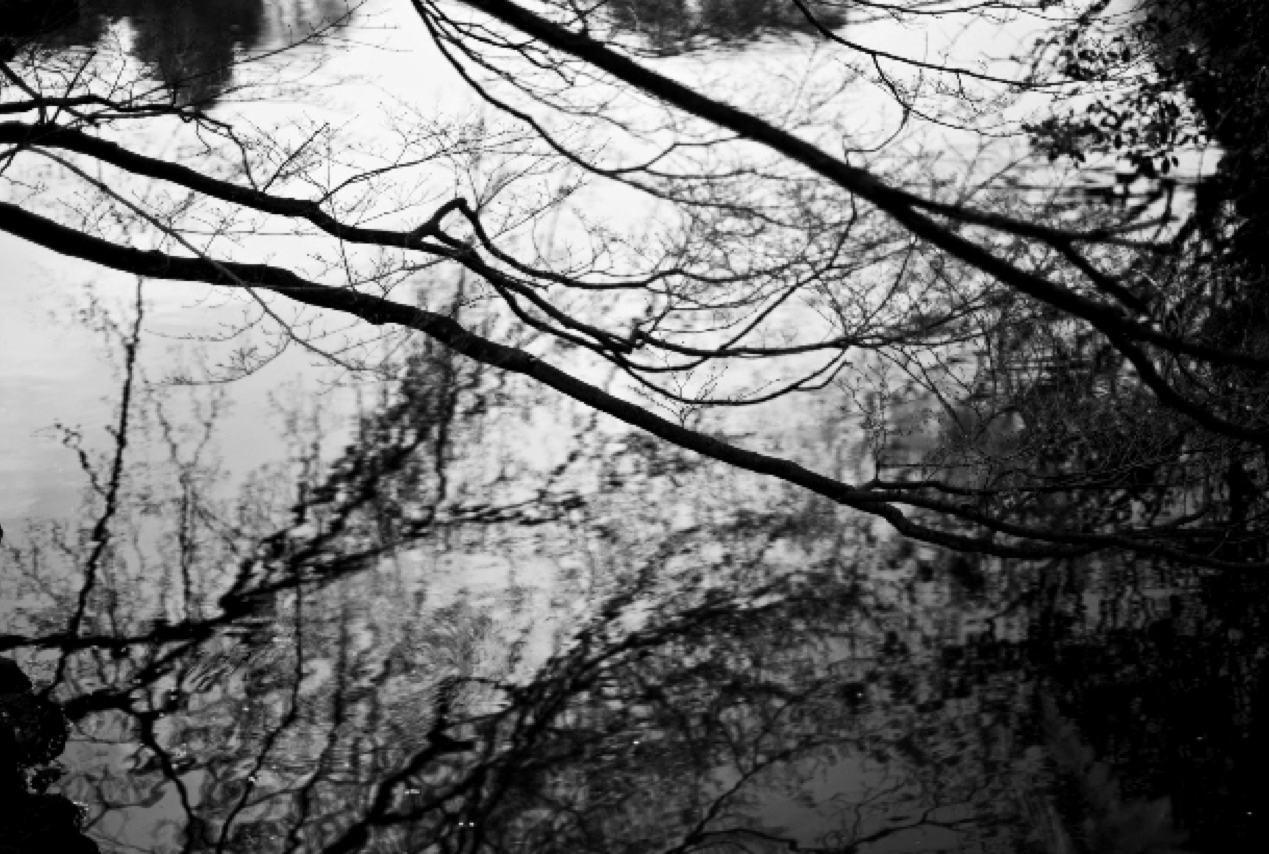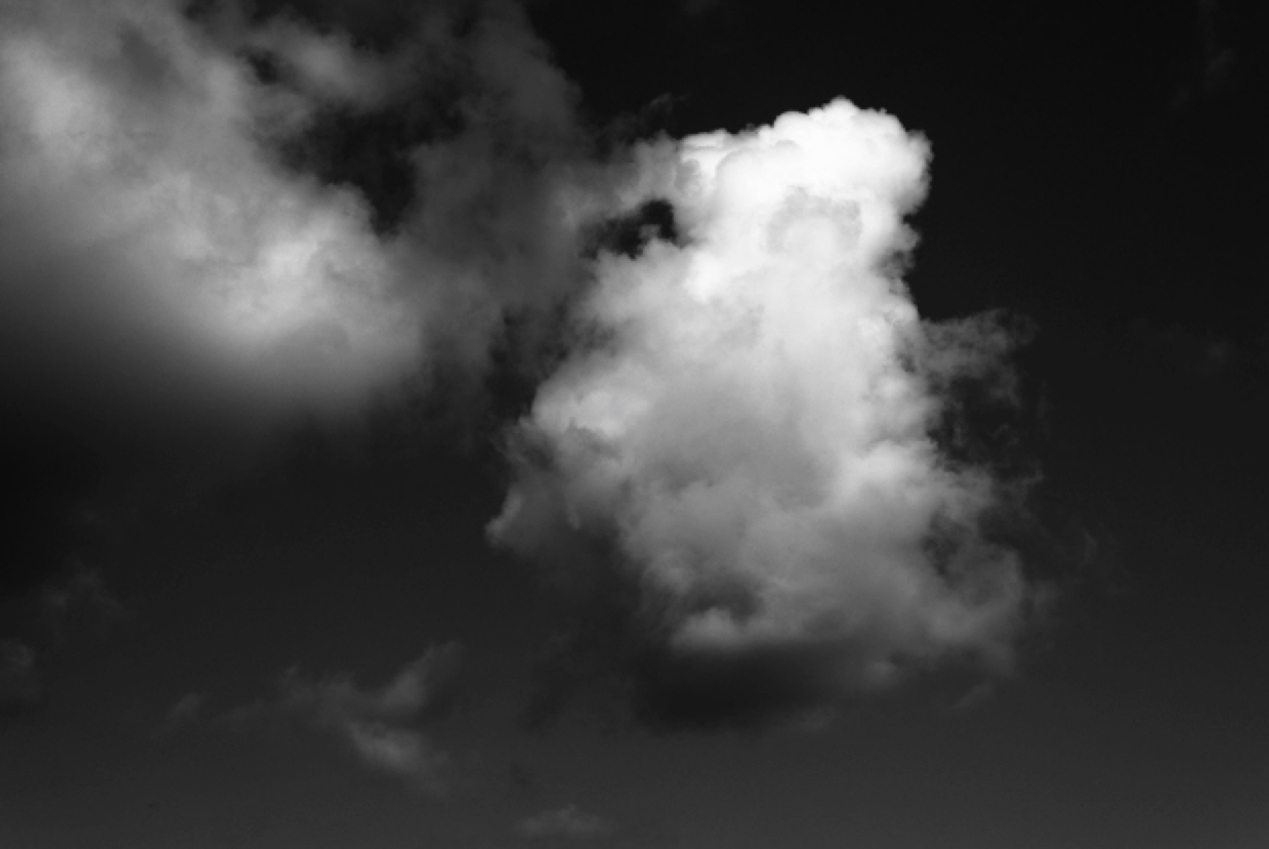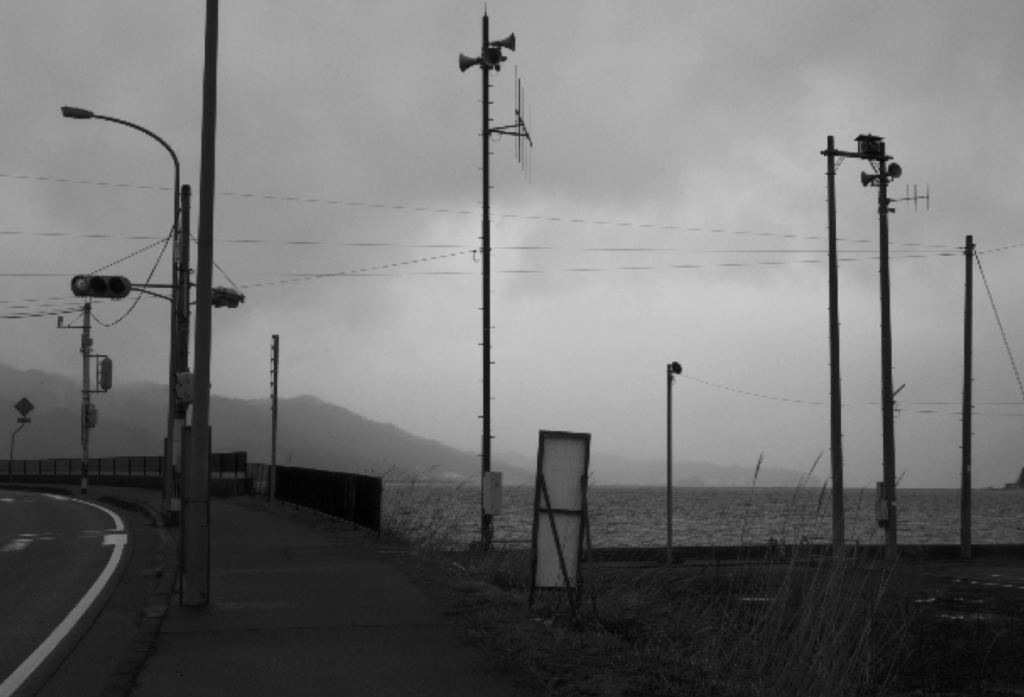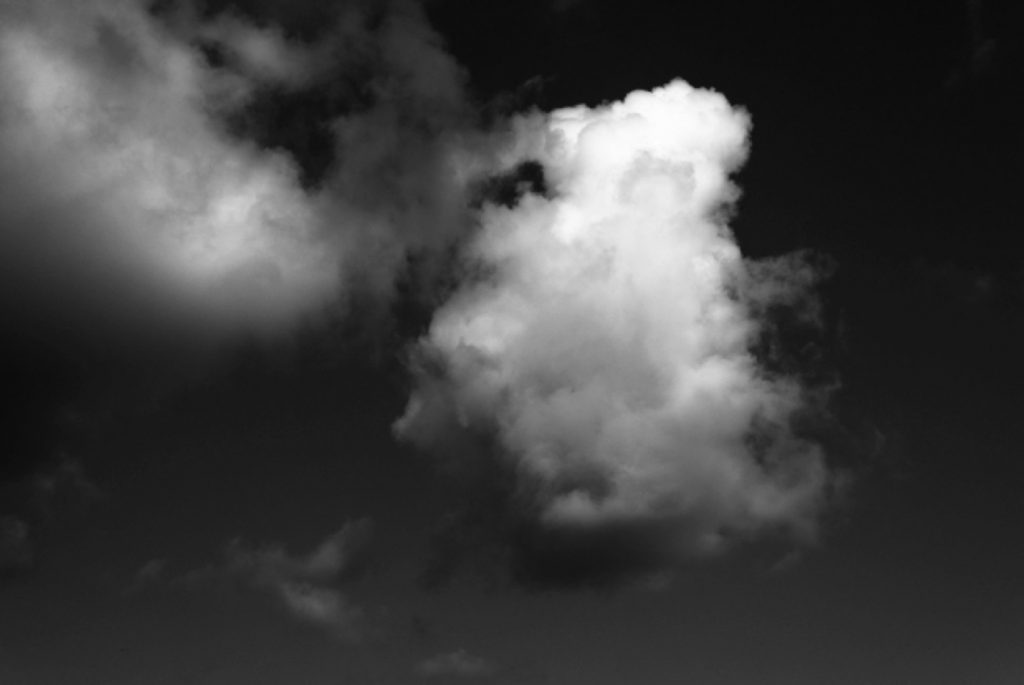II. FIRST VERSION


This version of the poem happened because I am unprofessional.
By April 2015 I had a pile of empty, thirteen-quid Moleskines given to me for ten successive birthdays. As such, I never bought notebooks, and grabbed one at random from the pile whenever one was filled.
That month, though, I was sent to Veracruz, eastern Mexico, on a story. The content doesn’t matter: the story was spiked because being sent to Veracruz, eastern Mexico, on a story is like being sent to the Bermuda Triangle on a diving expedition.
No: what matters is the time of year, April, just before the white, space-cancelling winter fogs begin to thin and vanish. The Veracruz-Mexico City highway is one of the country’s smoother thoroughfares. Even during the valley portion, when the road swings in wide curves above colourless nothing, you can lose yourself to driver trance, mistake the hum of tyre on asphalt for the roar of a jet-engine.
When I arrived in Córdoba, the day’s rain had the main square shining like an ice-rink. Families idled around the main square, the kids yawping, the grown-ups mostly yawning from the after-effect of heavy lunches. From a big speaker on the bandstand thrummed some ancient disco song which reminded me of nothing in particular, but whose arcing violin-lines had a kind of signifier of nostalgia to them, and so the uplift in my chest happened all the same, with shapes like the burst of fireworks erupting in candy tones of pink, orange, lime-green, albeit around a wettish, heavy memory that I couldn’t see, only feel, but not for too long, since that weight in my gut was sickly, overindulged, as though I’d become one of those kids rambling around the square, too full of sugar, with a big, bored crash incoming.
After a coffee and a sparkling water — I no longer drank — I got out my iPad and began to flick through my agenda for the week. The day’s date itched at the back of my skull — April 15th — but there was nothing in my agenda apart from ‘Córdoba drive — 9am to 2pm’, no forgotten bill, no interview, no craved-after release-date. At some point after checking in, my phone buzzed with a message from my mother, and the floor dropped out of my stomach.
‘An email would be the best birthday present he could ask for,’ she wrote. ‘Think about it, won’t you?’
For a moment I stood there with two bars of the disco song from the bandstand speakers looping in my head. ‘San Francisco Hustle’, Shazam had told me, a song I had literally never heard in my life, except perhaps in the sample of a Cut Copy, but from the shape traced by those cheap violins over the hot, vaguely erotic darkness of the bassline rose old pictures of video-game levels set in cities whose neon glitter looked like no city I’d ever been to, the mealy dog-odour of the beanbags on which my cousin and I would sprawl on our backs to zone out in front of Tekken Tag, the night outside shining like a split coal, our parents laughing in a kitchen of maple furniture and dim, overpriced lighting, comforted by the sudden access of money that everyone in the country seemed to have back at that time.
When the memory snapped, I opened my eyes to the email staring at me from the screen of my phone, and figured — with an actual, literal shrug — that, since it was already the day after back home, the best thing to would be to forget the email, arrange dinner with my fixer, and head to bed straight afterwards, without even messaging the medical student I was dating at the time — a girl of twenty, making her too young for me, even by the half–your–age–plus–seven rule, but by other signs also, such as the sparkly moon tattoo on her shoulder-blade, which made me think of the Dreamworks logo, of an innocence that might blur and grow hazy but never completely fade from her. Whenever she hoiked off her top I used to catch a waft of her pH-neutral deodorant, full in the face, and it was such a blankly clean odour that I thought of words like youth, hope, chances unspurned.

The drive back from Coatepec to Mexico City took me through Hidalgo and Estado de México, past a valley out of which white fog broke up endlessly, like a slow ocean. Beside the kinked road stood little wooden sheds where carpenters worked, with chopped logs glinting orange under their lamps.
By now, my bag held about six kilos of pages, printouts from all the documents I’d deleted from my computer. Even a couple of days later, my eyes still felt baked in their sockets from watching the printer in Coatepec’s only Internet café flash green as each page spat out into my hand. While waiting for cows to clear the road or for builders to wave me along, I’d run my fingers over the inked carves in the pages of the notebook I had happened upon, and which had begun this process, while in my head I saw myself walking through a columbarium, tracing half-faded names carved in marble.
Once back in the city, instead of driving home, I hid at the medical student’s apartment. Her place felt safer than my own, all neat lines, dim wattage, varnish-color sunlight through wood blinds, like the cover of a book about saddish rich people, and she was OK with me hauling over a sack of shredded paper and setting up at the kitchen table. What was more, my place was closer to the Centro, so the water would pour out at body temperature from my taps, making me imagine the city’s water-supply as an entrail tangle of leaky pipes. Further south, where she lived, the water spat out white and cold, and numbed the core of my teeth when I rinsed my mouth, so tart that I’d shut my eyes over the sink, see mountain freshets, green university acres rolling away towards white sun and empty skies, then open my eyes on the flocculent white toothpaste suds as they swirled out of sight.
‘You’re writing again!’ she said when she looked inside the bag. ‘That’s so nice!’
‘Kind of,’ I said, picking up an old tatter, trying to scry the mad ink tangle.
She was in her taekwondo gear, just back from training. Her parents are rich. There was a gym room in her apartment, because she represented Mexico in taekwondo. That’s not a niche interest: it’s the third biggest sport here, and they televise it. One of the medical student’s Facebook photos is her at a competition, her leg raised vertical towards the audience. There are cameras: a phosphor seethe of flashbulbs at the rim of the photo. She’s facing the other way, eyes aimed nonchalant out of the frame. Onwards, forwards, better, all that, she truly believed words like that had a magnetism, an existential drag that bound things to signal, meaning, directionality.
She sat down opposite my chair and said, ‘I love words. But I can only do sentences — phrases, little joined-up chains of words sometimes. Nothing finished. The thought breaks. The light goes out. You know?’
‘Hundred per cent,’ I said, holding the stained page to the light, barely able to make out through the tiny, enneagram scrawl the record of a meeting between my father and I, at a pub, where I slugged down two Carlsbergs before lunch arrived. My father had literally bitten the edge of his finger in a bid to hide how he felt about how I looked, and I could understand his point, since I had vomited into two different bins on my way to meet them. This was towards the end of my final year in Trinity, at which point it looked like I was going to get another big academic prize. At the same time, though, I had been too drunk and frazzled to get applications together for the kind of postgrad scholarships I should have been applying for. The word burnout had begun to hover in my head, unsaid, but definitely felt, so much so that the word almost had its own sharp, yellow smell, as so often accompanies a lightbulb filament which is rattling so much that it’s about to snap.
This had been a long time coming, really, since all the way through university I had pushed myself extremely hard as a way of making up for the ostensible uselessness of my degree. Mine was a four-year-long apology written in achievements, but it’s not like that was a damage-free proces. The sense of wealth and privilege all around me was like running my temples back and forth again and again between two big walls made of pumice, to the point where all I can remember without any pain is a very short series of images: how the cobblestones looked like mussel-shells in the swirling mud and rain; the toffee-colored tiles of the Arts Block; the windowless, striplit tutorial rooms.
As well as assuaging my own guilt, the hope was that by overachieving I’d manage some kind of uplift above the situation, so that it didn’t hurt me anymore. But this feeling didn’t arrive even after my first big academic prize came through, and so my drinking intensified. Wine was the chosen fuel, because two bottles got me numb enough to read and think. To hide the smell I ate an entire tablespoonful of peanut butter on its own before classes, or else smoked rollies until the whorls of my fingertips went dun, one stink canceling another, as the ethanol and nicotine in my blood ignited, set off a cruise-speed of thought and work that pretty much nobody could catch up with. To sleep I’d polish off a third, and the image of dumping water over a computer instead of shutting it off wasn’t often far from my mind, with my sleep being more like a hissing, burned-out aftermath. The advantage of wine was that the empties were capacious enough to keep in my room and piss into, when the world was too blurry to move through..
At the pub that morning, I talked vaguely and quickly about moving to Prague after graduating.
My father sniffed. ‘To do what?’
‘Just … nothing,’ I said. ‘Just be for a bit.’ Although the words were casual, the tone was pleading.
‘You can’t do nothing forever,’ my father said. ‘We all have to earn a living. That’s how the world works.’
‘I didn’t mean forever,’ I said, signaling for another pint when the waitress swoops in for my empty glass. ‘Just for a bit. Until things stop spinning, or whatever.’
My father frowned. ‘It’s one o’clock.’
‘I got up early,’ I said. ‘What are you drinking?’
Da indicates forlornly his failed tea, his acrid coffee. ‘Not impressed so far,’ he says. ‘Perhaps some water.’ The hope was bright in his voice. ‘They can’t mess up water, can they?’
‘Spirochetes,’ I said, and raised my fresh pint.
While the medical student went out to meet her coach, I stayed home, filtering out everything from the notebooks that had any emotional content. What remained were descriptions, fragments of dialogue robbed from other people’s books or films, and an embellished version of Boccaccio’s story from the Life of Dante.
When I was done, I fell asleep on her couch, with a bootleg DVD of Chinatown playing so as to cancel all thought. When I woke, the medical student had pulled a blanket over me and left a Post-It with two ‘X’s and a smiley face written on it. The DVD player had stopped and gone back to the TV, where a nature documentary showed a heron stooping toward clear water, dabbling its beak, bringing up a chunk of moss, which it shook and tossed aside, scattering droplets of lit water.
Found Poem – Second Version
Roland Barthes: ‘After an extrapleural pneumothorax operation, the removed section of rib was returned to me by the hospital. Often I have toyed with flinging the rib–chop from my balcony, as though romantically scattering my own ashes into the river.
Found Poem – Third Version
This version happened because where I live now, there’s no fog: just particles of air-pollution, car-exhaust, scorched proteins from the taco-stands. The rain brings a sea-spray effect, certainly, but for the most part I’m living in a parodic, overheated version of...

